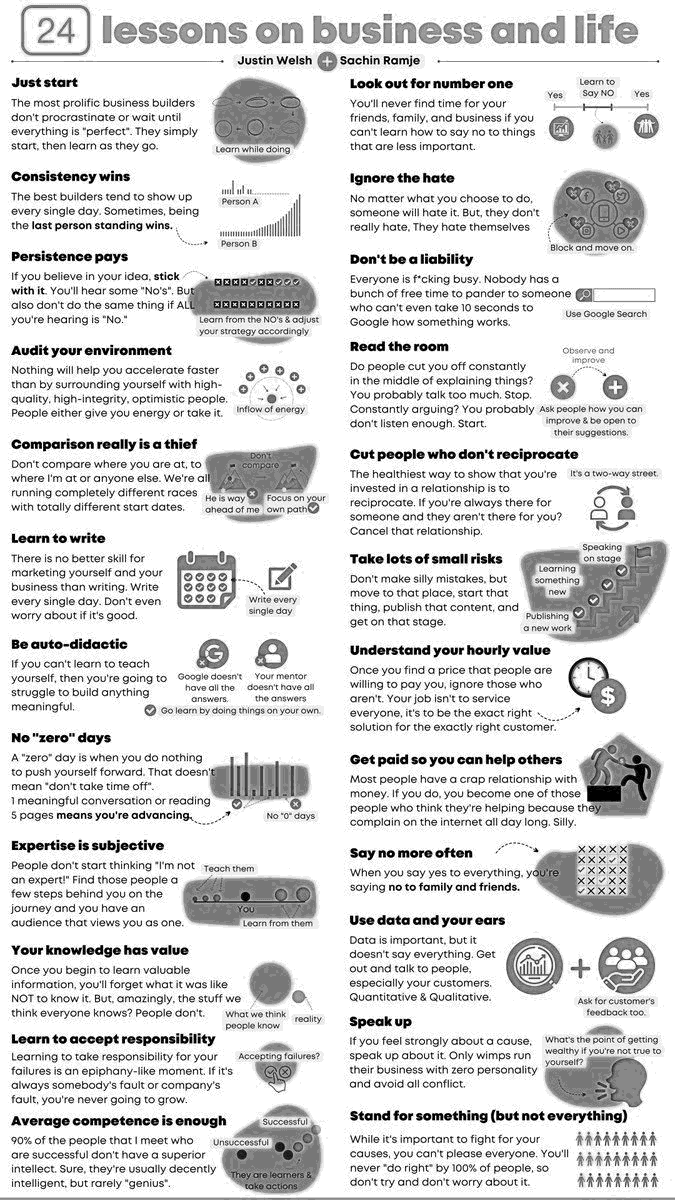
Life and business are full of challenges, opportunities, and moments of growth. To successfully navigate these challenges, it’s essential to have actionable insights that provide guidance. Here are 24 lessons designed to help you navigate both effectively. These are not just theories but practical tips you can apply right away to improve your personal and professional journey. Each lesson is designed to inspire and empower you, helping you take tangible steps toward achieving your goals.
These principles provide clarity and direction when you're starting a new venture, building better habits, or striving for balance. By incorporating these lessons into your daily life, you’ll develop the resilience, focus, and skills needed to thrive in a competitive world. Embrace them as tools for growth and let them illuminate your path to success.

Just Start
The best way to succeed is to begin. Don't wait for the perfect moment or everything to fall into place. Whether launching a business or learning a new skill, progress comes from action, not overthinking. Many successful individuals learned by doing and adjusting as they went along. By starting, you open the door to opportunities, learning experiences, and personal growth that wouldn't be possible if you stayed idle.
For example, if you've always wanted to start a blog, write your first post today, even if it's just a draft. You can continually refine your work later, but you can't improve on something that doesn't exist. Progress is not about perfection but about consistent steps forward. So, take that first step now—you'll thank yourself later.
Consistency Matters
Success often comes to those who show up daily, not just when they feel like it. Building a habit of consistent effort—whether in your career, relationships, or personal growth—creates momentum that compounds over time. Consistency builds trust in yourself and others, showing reliability and dedication.
Even on tough days, doing something small moves you closer to your goals. For example, if you're learning a new skill like coding, practice daily, even if it's just 15 minutes. Over time, these small efforts accumulate into expertise. Remember, it's not about the grand gestures but the steady progress that makes a difference.
Persistence Pays Off
Believing in your idea and sticking with it despite setbacks is crucial. Persistence doesn't mean repeating the same strategies if they don't work. It's about adapting and trying new approaches while staying committed to your goal.
History is full of examples of individuals who faced repeated failures before achieving success, like Thomas Edison, who famously tested thousands of designs before inventing the light bulb. Take rejection or failure as feedback, not as a stopping point. Learn from the "No's" and refine your methods to turn them into "Yes's." Persistence, coupled with adaptability, is a powerful combination for achieving long-term success.
Surround Yourself With the Right People
Your environment plays a massive role in your success. Spend time with people who uplift, inspire, and constructively challenge you. High-quality relationships act as a catalyst for growth, while negative influences can hinder your progress.
For instance, being an aspiring entrepreneur, surrounding yourself with like-minded individuals or mentors can provide valuable insights and encouragement. These connections inspire you and create opportunities you may not discover alone. Evaluate your circle regularly and prioritize relationships that add value to your life.
Stop Comparing Yourself to Others
Everyone's journey is unique. Comparing your progress to someone else's can lead to frustration and self-doubt. Instead, focus on your path and celebrate your milestones, no matter how small. Remember that social media often showcases highlights, not struggles.
For example, while one person's career might take off in their twenties, another might achieve their dreams later in life. We all have different starting points, opportunities, and challenges. By focusing on our progress and maintaining a positive mindset, we can find joy in our journey and reduce unnecessary stress.
Develop Writing Skills

Clear communication is a powerful tool in life and business. Writing every day, even if it's just journaling or brainstorming ideas, sharpens one's ability to express oneself. Over time, one will become better at sharing one's thoughts, which is invaluable for marketing, leadership, and building relationships.
For example, well-written emails can enhance your professional image, while compelling blog posts can attract an audience. Writing also helps clarify your thoughts and make better decisions. Start by setting aside 10 minutes daily to write about anything that interests you. The key is consistency.
Learn to Teach Yourself
Being self-taught allows you to adapt quickly and take on new challenges. Use resources like books, videos, and online courses to acquire skills. For instance, if you're interested in graphic design, free tutorials and tools like Canva or Photoshop can help you get started.
Self-learning saves time and money and builds confidence in one's ability to solve problems independently. In a world where knowledge is constantly evolving, the ability to teach oneself is an invaluable skill that keeps one ahead of the curve.
Avoid "Zero Days"
A "zero-day" is when you do nothing to move forward. Instead, aim to do at least one small productive task daily. This could be reading a few pages of a book, having a meaningful conversation, or jotting down new ideas.
Small actions compound into significant results over time. For example, writing just 100 words daily can lead to finishing a book within a year. The goal is to maintain momentum, even if progress feels slow. Remember, any step forward, no matter how small, is better than standing still.
Expertise Is Relative
You don't need to be the best in your field to add value. People who are a few steps behind you can benefit from your knowledge and experiences. For instance, a beginner at coding might find your experience as an intermediate learner incredibly helpful.
Share what you know, and don't undervalue your expertise. Your unique perspective and approach can often resonate more with others than advice from top-level experts.
Share What You Learn
As you grow and acquire new knowledge, don't keep it to yourself. Teaching others reinforces your learning and establishes you as a resource in your field. For example, sharing tips on social media or writing blog posts about your journey can inspire others while solidifying your understanding.
Sharing insights helps you build a network and creates a sense of community. Collaboration often leads to unexpected opportunities, making sharing a win-win.
Take Responsibility for Your Actions
Accepting responsibility for mistakes and failures is empowering. It demonstrates maturity and a desire to develop. While shifting blame may feel more effortless, it prevents you from learning and improving.
For example, if a work project doesn't go as planned, owning your part in it allows you to recognize areas for improvement and build trust with your team. People respect those who take accountability and work towards solutions.
You Don't Have to Be a Genius
Many successful people are not prodigies; they're consistent learners. Focus on being curious and hardworking. For instance, entrepreneurs like Sara Blakely of Spanx credit their success to persistence and adaptability, not innate genius. Your willingness to learn and adapt often matters more than natural talent. By prioritizing effort over perfection, you can achieve remarkable results.
Prioritize Yourself

Make it a priority to decline activities or obligations that do not align with your values and goals. This frees up time for what truly matters—your health, relationships, and goals. Boundaries are essential for maintaining balance and avoiding burnout. For example, turning down an unnecessary meeting can allow you to spend quality time with your family or focus on a personal project. Remember that when you say no to others, you often prioritize your needs.
Ignore Negativity

Haters will always exist, whether online or in your personal life. Understand that criticism often reflects more about them than about you. Focus on constructive feedback and let go of the rest. For instance, if someone criticizes your work without offering actionable suggestions, it's likely not worth your energy. Instead, surround yourself with supportive individuals who provide meaningful insights.
Be Resourceful, Not a Burden
In today's connected world, answers are often just a search away. Before asking for help, try to solve problems independently. Showing initiative demonstrates responsibility and builds confidence in your abilities. For instance, learning to troubleshoot fundamental tech issues can save you and your friends time and effort. Resourcefulness is a skill that earns respect and fosters independence.
Read the Room
Understanding your audience is vital. Be attentive to nonverbal cues and modify your approach as needed. Listening is often more impactful than speaking in a meeting or casual conversation. For example, if you notice someone's body language indicates confusion, take a moment to clarify your point. Adapting to your audience's needs makes your communication more effective and builds stronger connections.
Let Go of One-Sided Relationships
Healthy relationships are built on mutual effort and respect. If you're always giving and not receiving, it's time to reevaluate your connection. Surround yourself with people who value you as much as you value them. For example, if a friend continuously cancels plans or shows little interest in your life, it might be time to step back. Prioritize balanced and fulfilling relationships.
Take Calculated Risks
Success frequently arises from stepping outside your comfort zone. This could mean starting a side hustle, attending a networking event, or trying something new at work. Taking small, manageable risks helps you grow without overwhelming yourself. For instance, pitching a new idea to your team might feel intimidating but could lead to exciting opportunities. The key is to assess the potential rewards against the risks and take appropriate action.
Know Your Value
Understanding your worth lets you set fair service prices or negotiate better salaries. It's not about being arrogant but about recognizing the time, effort, and skills you bring. For example, if you're a freelance designer, research industry rates and confidently quote your services. Knowing your value ensures you're compensated fairly and fosters self-respect.
Money Is a Tool

Money enables you to help others and invest in meaningful causes. Building a healthy relationship with finances can lead to more significant opportunities for yourself and those around you. For instance, setting aside some of your income for charitable donations or education can create a lasting impact. View money as a means to achieve goals rather than an end.
Learn to Say No
Agreeing to everything can result in taking on too many responsibilities and experiencing stress. When you agree to something, you're sacrificing time and energy that could be used for more meaningful priorities. Practice saying no politely but firmly. For example, declining a last-minute project at work might allow you to focus on delivering quality results for your existing tasks. Prioritizing your time ensures you can give your best where it matters most.
Combine Data With Empathy
While data can provide valuable insights, it's equally important to understand the human side. Whether making business decisions or interacting with customers, balance quantitative metrics with qualitative feedback. For example, sales figures might show a drop in performance, but talking to customers could reveal underlying issues like dissatisfaction with a product feature. Combining data and empathy leads to more effective solutions.
Speak Up When It Matters
If you're passionate about something, voice your opinion. Staying silent to avoid conflict can lead to resentment. Respectfully sharing your perspective fosters open dialogue and strengthens relationships. For instance, if you disagree with a decision at work, calmly presenting your viewpoint can improve outcomes and show your commitment to the team's success.
Focus on a Few Key Causes
You can't tackle every issue or support every cause. Choose what resonates most with you and dedicate your energy to it. Trying to do everything dilutes your efforts and can leave you feeling scattered. For example, if you're passionate about education, focus your volunteer work and donations on that area rather than spreading yourself too thin. Concentrating on a few key causes allows you to make a deeper, more profound, meaningful impact.
Why is It Essential?
Understanding why these lessons matter is the key to effectively applying them in your life and business. Each point builds a foundation for personal growth, meaningful relationships, and professional success.
For instance, consistent habits enable steady progress, while persistence helps you overcome challenges and seize opportunities. Being around positive influences creates a supportive environment that promotes success and inspires you.
These lessons are essential because they prioritize action over inaction, focus over distraction, and adaptability over rigidity. They empower you to set boundaries, take responsibility, and grow from setbacks, which are critical in both personal and professional spheres. By embracing these principles, you gain clarity, reduce unnecessary stress, and enhance your ability to achieve long-term goals. When applied consistently, these lessons transform your mindset, equipping you with the tools to thrive in all aspects of life.
Conclusion:
Reflecting on these 24 lessons provides a roadmap for navigating the challenges and opportunities in life and business. Each point emphasizes practical actions that foster growth, resilience, and meaningful relationships. By consistently applying these principles, you create a solid foundation for success and develop a more profound sense of purpose and fulfillment.
For example, taking responsibility for your actions builds trust and maturity, while focusing on your progress helps you avoid the pitfalls of comparison. These lessons remind us that success is not a destination but a journey built on small, intentional steps. Whether you learn to prioritize yourself, embrace calculated risks, or say no to distractions, these insights are tools for crafting a balanced and rewarding life. Could you start applying them today and observe the transformation?
These 24 lessons serve as a guide to navigating both the complexities of life and the demands of business. Apply them thoughtfully, and you'll grow personally and professionally in meaningful ways. Small, consistent actions often lead to the most rewarding results.
Motivational Topics

